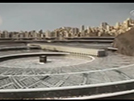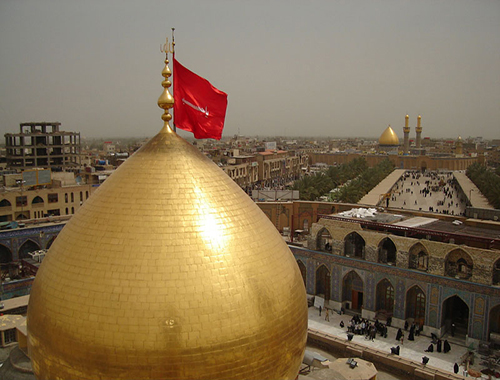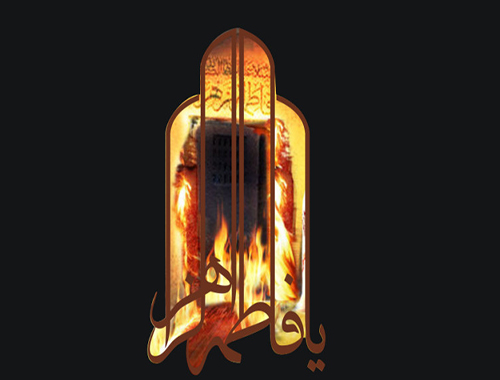Verses 8-16
- Details
- Hits: 3425
Sura Qashiyah
(The Overwhelming Event)
No.88 ( Verses 8-16)
(8) وُجُوهٌ يَوْمَئِذٍ نَّاعِمَةٌ
(9) لِسَعْيِهَا رَاضِيَةٌ
(10) فِي جَنَّةٍ عَالِيَةٍ
(11) لَّا تَسْمَعُ فِيهَا لَاغِيَةً
(12) فِيهَا عَيْنٌ جَارِيَةٌ
(13) فِيهَا سُرُرٌ مَّرْفُوعَةٌ
(14) وَأَكْوَابٌ مَّوْضُوعَةٌ
(15) وَنَمَارِقُ مَصْفُوفَةٌ
(16) وَزَرَابِيُّ مَبْثُوثَةٌ
8.(other)faces that Day will be joyful
9. Pleased with their Striving
10. In a Garden on high,
11. Where they shall hear no (word) of vanity.
12. Therein is a fountain flowing,
13. Therein are thrones raised high,
14. And goblets placed (ready),
15. And Cushions set in rows,
16. And rich carpets (all) spread out.
Commentary:
A Perspective of the Blessings in Heaven:
After the description of the sinners' status, in the Next World, and their punishments in Hell in the aforementioned verses, the following verses refer to the situation of the believers and good-doers and their heavenly blessings; to inform them about both Allah's Wrath and Grace; punishment and reward.
(Other) faces that Day will be joyful,
These faces contrast with the sinners' 'down cast, weary' faces, that were described in the former verses.
The term /na'imah/ is based on /ni'mat/ 'comfort and convenience of Iife'. Here, it means the joyful faces which beam bright with the comfort of Bliss; as is said in Sura Mutaffifin, No 83, verse 24: Thou wilt recognise in their faces the beaming brightness of Bliss.
* * * *
These faces look happy, because they are:
Pleased with their Striving.
They are content with the result of their hard struggle, in contrast with the sinners who are Labouring (hard), weary and gain no profit from their striving.
The doers of good, under the light of Allah's favour and beneficence, have gained additional rewards; sometimes tenfold, sometimes seven hundred times as much, and sometimes even more than that. And, sometimes, they may be given 'rewards without measure' for their deeds, as Sura Zumar, No.39, verse 10 says:Those who patiently persevere will truly receive a reward without measure.
* * * *
Then, to describe that state, it says:
In a Garden on high,
The term /'aliyat/ may refer to the height of a place that means 'they are in a high place in Heaven', or it refers to the highness of their rank, or both of them, but, the second commentary seems more suitable, though both of the ideas are probable.
Then, it describes Bliss from a spiritual point of view, and says:
Where they shall hear no (word) of vanity.
They will hear neither hypocrisy nor enmity or conflict. They will hear nothing, there, unbecoming, foolish or vain: no word of discord, enmity, hatred; not a lie, accusation, back-biting, nor idle talk.
And what a comfortable environment is such a place where none of these inappropriate words is heard. In fact, they are the origin of many troubles, and discomforts of our life in this world. They disturb the peace of our spirit and the regularity of societies; which lights the fire of sedition.
* * * *
After the explanation about the existence of the spiritual blessing of hearing no vain word, it continues and explains a part of the material blessings of Heaven, saying:
Therein is afountainflowing,
The word 'fountain' is singular in its Arabic text. Similar cases occur in the Qur'an, like Sura Zariyat, No.51, verse 15 which says: As to the Righteous, they will be in the midst of Gardens and Springs, where 'spring' is used in the plural form, then the indefinite singular form of /'ayn/ 'fountain', in this verse, means 'some numerous other fountains.
Some commentators have said that since there is a spring in every castle, in Heaven belonging to the believers, which flows in every direction that they wish it to, without digging special canals, so, 'spring' is mentioned in the singular form, but they are numerous, indeed, and are useful for their beauty, different wholesome sweet water, and whenever the Righteous wish to, they drink, therefrom.
* * * *
Then attention is paid to thrones and says:
Therein are thrones raised high.
The term /surur/ is the plural form of /sarir/ based on / surur/ 'a throne' (which is usually used in felicitous gatherings).
The thrones are raised high for the Righteous to see all of their surroundings, enjoy the beautiful breath-taking sceneries and find great pleasure in them.
Ibn-Abbas says that these high thrones are set in such a way that when the Righteous are going to sit on them they lower themselves in humility, for their owners, and then when the righteous sit down the thrones rise again.
It is probable that 'the thrones are raised high' means that they are very precious, because it is said that they are made of gold and are decorated with topaz, pearls, and rubies.
However, both commentaries are possible.
* * * *
As they need some kind of utensil to drink the pure drink from the springs, it says:
And goblets placed (ready).
Whenever they wish, the goblets are filled from the springs and are ready, in front of them, to drink and enjoy, to their hearts content. Its pleasure is impossible for the dwellers of this world to describe.
The term /akwab/ is the plural form of /kub/ which means 'either a goblet or any cup with a handle'.
It is necessary to note that there are different names given for the containers of 'the pure drink', in Heaven, mentioned in the holy Qur'an. Here, in this verse, as in some other verses, it is called /abariq/ A the plural form of /ibriq/ a cup with a spout and handle to pour the drink; or /ka's/ 'a cup full of drink' as Sura Waqi'ah, No.56, verse 17-18 say: Round about them will (serve) youths of perpetual freshness). With goblets, (shining) beakers, and cups (filled) from clear-flowing fountains.
* * * *
It describes further details about Heaven and says:
And Cushions set in rows,
The term /namariq/ is the plural form of /numruqah/ 'a pillow or soft pad for sitting or kneeling on, or reclining against usually for relaxing'. And the term /masfufah/ 'set in rows' denotes that there are numerous cushions arranged in order for some people to have a meeting in which they hear no vain talk, but the words are about the endless blessings of Allah and being saved from both the troubles and struggles of the physical world and the punishments of the spiritual world. It is so enjoyable and excellent that nothing can match it.
Finally, it points (0 the splendid carpets in Heaven and says:
And rich carpets (all) spread out.
The term /zarabiyy/ is the plural form of /zaribah/ which means 'piled, lush carpets ofhigh quality that are both comfortable, with a high and costly'.
It is clear that there are also other facilities equal to what is mentioned above; which are a means of enjoyment and comfort, of which only a few examples are given, indicating that there are numerous of them in Heaven.
There are seven heavenly blessings mentioned in these verses; each of which is finer than the other.
In short, Heaven, an eternal home, is a unique place of no fear or grief, free from any toil or weariness, no vanity or untruth; completely in peace and security; joyful, with different kinds of fruits and pure drinks in attractive goblets and cups of gold placed, ready, over some bejewelled thrones of dignity raised high, with rich carpets spread out, beside the flowing springs with youths of perpetual freshness serving among good companions and chaste women.
In conclusion, there are immense blessings that one can neither describe with the limited human vocabulary of this world nor can one conceive in the imagination. All of them, and beyond what anyone can contemplate, are ready-made for the Righteous who obtain permission to enter Allah's Bliss because of their righteous deeds.
Besides the physical pleasures, there are the spiritual pleasures, the best of which is the meeting with Allah, in Heaven, while Allah is well pleased with them, and they also with Him.











